Developing Manager Assignment: Leadership, Communication and Skills
VerifiedAdded on 2020/10/22
|19
|6520
|431
Report
AI Summary
This report, titled 'The Developing Manager,' delves into the intricacies of management styles, leadership characteristics, and communication processes within businesses, using the Marriott and Hilton hotel chains as illustrative examples. The report dissects various management styles, including democratic and laissez-faire approaches, and explores leadership characteristics like transformational and active leadership. It also examines internal and external communication methods, such as upward, downward, and horizontal communication, along with different forms like emails, meetings, and written communication. Furthermore, the report evaluates personal management skills, analyzes strengths, weaknesses, opportunities, and threats (SWOT), and outlines strategies for career development, including setting objectives and targets. The report also provides insights into leading and motivating a team, making managerial decisions, and creating a comprehensive development plan to support career advancement.
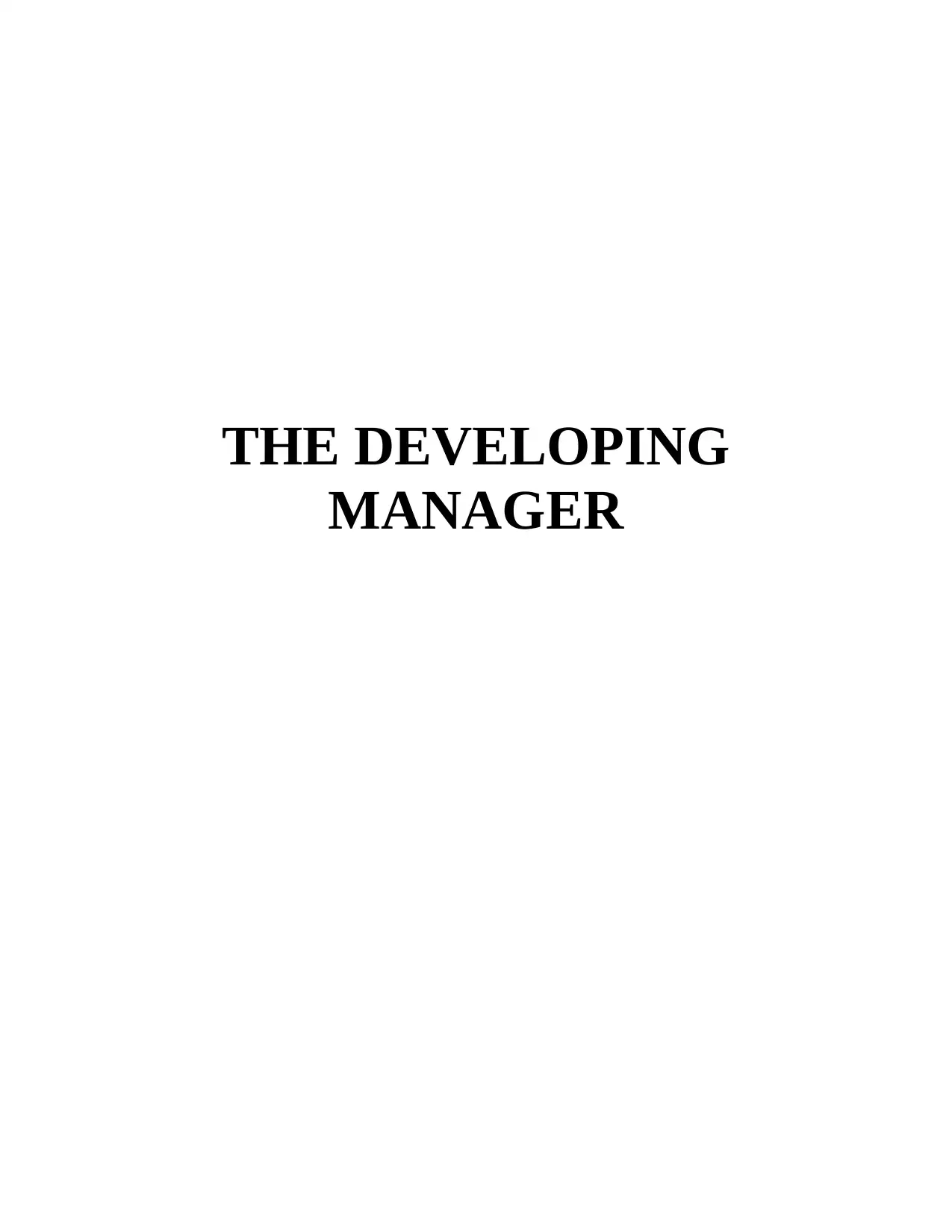
THE DEVELOPING
MANAGER
MANAGER
Paraphrase This Document
Need a fresh take? Get an instant paraphrase of this document with our AI Paraphraser
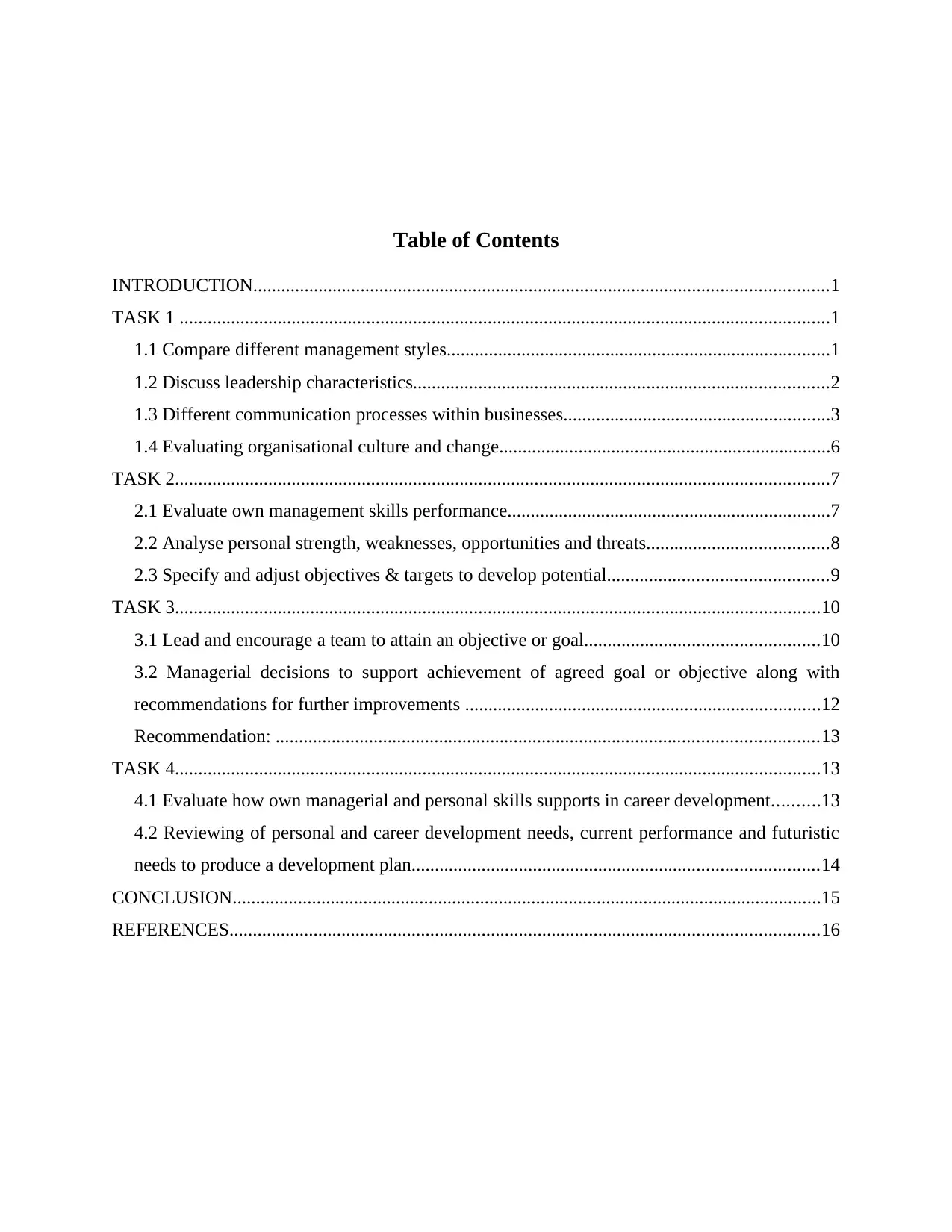
Table of Contents
INTRODUCTION...........................................................................................................................1
TASK 1 ...........................................................................................................................................1
1.1 Compare different management styles..................................................................................1
1.2 Discuss leadership characteristics.........................................................................................2
1.3 Different communication processes within businesses.........................................................3
1.4 Evaluating organisational culture and change.......................................................................6
TASK 2............................................................................................................................................7
2.1 Evaluate own management skills performance.....................................................................7
2.2 Analyse personal strength, weaknesses, opportunities and threats.......................................8
2.3 Specify and adjust objectives & targets to develop potential...............................................9
TASK 3..........................................................................................................................................10
3.1 Lead and encourage a team to attain an objective or goal..................................................10
3.2 Managerial decisions to support achievement of agreed goal or objective along with
recommendations for further improvements ............................................................................12
Recommendation: ....................................................................................................................13
TASK 4..........................................................................................................................................13
4.1 Evaluate how own managerial and personal skills supports in career development..........13
4.2 Reviewing of personal and career development needs, current performance and futuristic
needs to produce a development plan.......................................................................................14
CONCLUSION..............................................................................................................................15
REFERENCES..............................................................................................................................16
INTRODUCTION...........................................................................................................................1
TASK 1 ...........................................................................................................................................1
1.1 Compare different management styles..................................................................................1
1.2 Discuss leadership characteristics.........................................................................................2
1.3 Different communication processes within businesses.........................................................3
1.4 Evaluating organisational culture and change.......................................................................6
TASK 2............................................................................................................................................7
2.1 Evaluate own management skills performance.....................................................................7
2.2 Analyse personal strength, weaknesses, opportunities and threats.......................................8
2.3 Specify and adjust objectives & targets to develop potential...............................................9
TASK 3..........................................................................................................................................10
3.1 Lead and encourage a team to attain an objective or goal..................................................10
3.2 Managerial decisions to support achievement of agreed goal or objective along with
recommendations for further improvements ............................................................................12
Recommendation: ....................................................................................................................13
TASK 4..........................................................................................................................................13
4.1 Evaluate how own managerial and personal skills supports in career development..........13
4.2 Reviewing of personal and career development needs, current performance and futuristic
needs to produce a development plan.......................................................................................14
CONCLUSION..............................................................................................................................15
REFERENCES..............................................................................................................................16
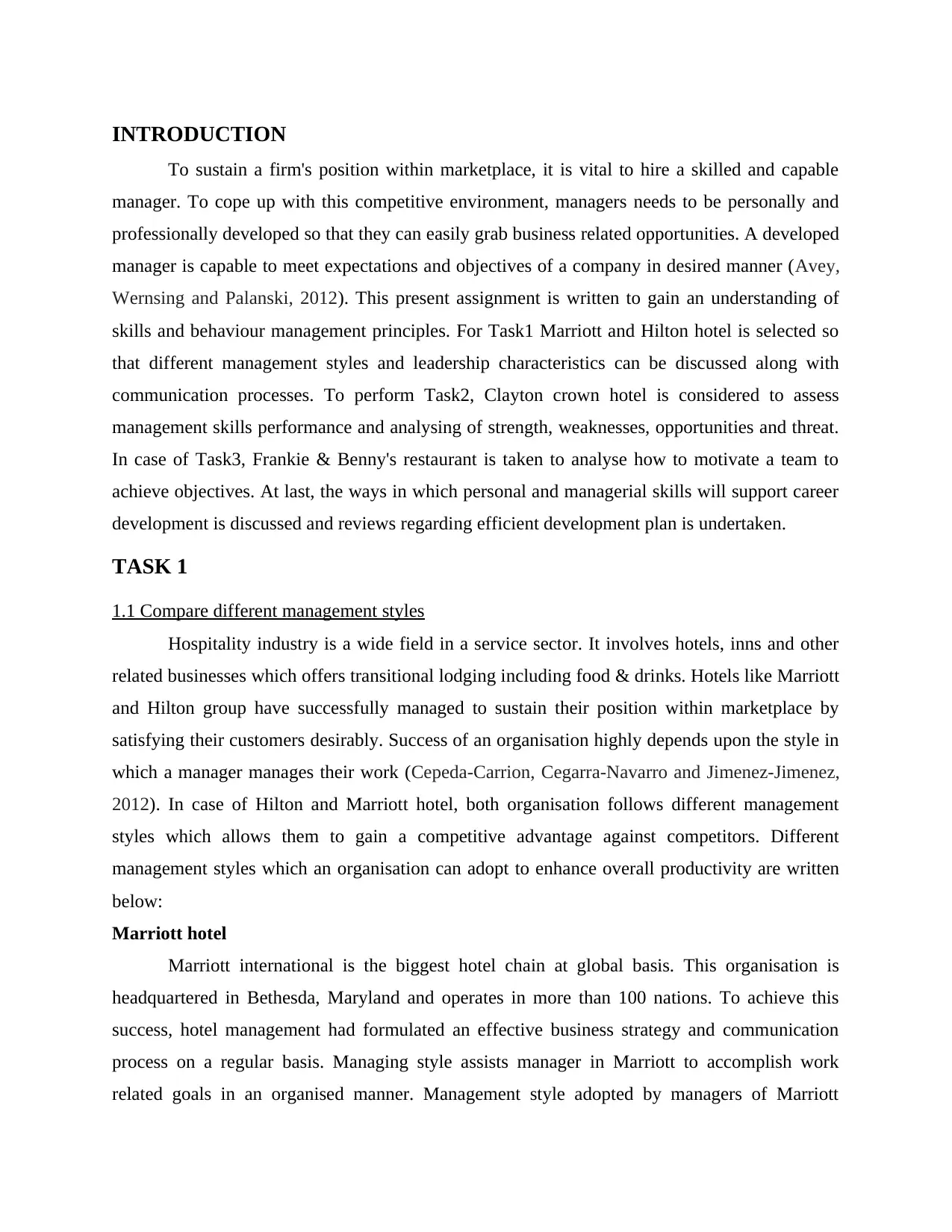
INTRODUCTION
To sustain a firm's position within marketplace, it is vital to hire a skilled and capable
manager. To cope up with this competitive environment, managers needs to be personally and
professionally developed so that they can easily grab business related opportunities. A developed
manager is capable to meet expectations and objectives of a company in desired manner (Avey,
Wernsing and Palanski, 2012). This present assignment is written to gain an understanding of
skills and behaviour management principles. For Task1 Marriott and Hilton hotel is selected so
that different management styles and leadership characteristics can be discussed along with
communication processes. To perform Task2, Clayton crown hotel is considered to assess
management skills performance and analysing of strength, weaknesses, opportunities and threat.
In case of Task3, Frankie & Benny's restaurant is taken to analyse how to motivate a team to
achieve objectives. At last, the ways in which personal and managerial skills will support career
development is discussed and reviews regarding efficient development plan is undertaken.
TASK 1
1.1 Compare different management styles
Hospitality industry is a wide field in a service sector. It involves hotels, inns and other
related businesses which offers transitional lodging including food & drinks. Hotels like Marriott
and Hilton group have successfully managed to sustain their position within marketplace by
satisfying their customers desirably. Success of an organisation highly depends upon the style in
which a manager manages their work (Cepeda‐Carrion, Cegarra‐Navarro and Jimenez‐Jimenez,
2012). In case of Hilton and Marriott hotel, both organisation follows different management
styles which allows them to gain a competitive advantage against competitors. Different
management styles which an organisation can adopt to enhance overall productivity are written
below:
Marriott hotel
Marriott international is the biggest hotel chain at global basis. This organisation is
headquartered in Bethesda, Maryland and operates in more than 100 nations. To achieve this
success, hotel management had formulated an effective business strategy and communication
process on a regular basis. Managing style assists manager in Marriott to accomplish work
related goals in an organised manner. Management style adopted by managers of Marriott
To sustain a firm's position within marketplace, it is vital to hire a skilled and capable
manager. To cope up with this competitive environment, managers needs to be personally and
professionally developed so that they can easily grab business related opportunities. A developed
manager is capable to meet expectations and objectives of a company in desired manner (Avey,
Wernsing and Palanski, 2012). This present assignment is written to gain an understanding of
skills and behaviour management principles. For Task1 Marriott and Hilton hotel is selected so
that different management styles and leadership characteristics can be discussed along with
communication processes. To perform Task2, Clayton crown hotel is considered to assess
management skills performance and analysing of strength, weaknesses, opportunities and threat.
In case of Task3, Frankie & Benny's restaurant is taken to analyse how to motivate a team to
achieve objectives. At last, the ways in which personal and managerial skills will support career
development is discussed and reviews regarding efficient development plan is undertaken.
TASK 1
1.1 Compare different management styles
Hospitality industry is a wide field in a service sector. It involves hotels, inns and other
related businesses which offers transitional lodging including food & drinks. Hotels like Marriott
and Hilton group have successfully managed to sustain their position within marketplace by
satisfying their customers desirably. Success of an organisation highly depends upon the style in
which a manager manages their work (Cepeda‐Carrion, Cegarra‐Navarro and Jimenez‐Jimenez,
2012). In case of Hilton and Marriott hotel, both organisation follows different management
styles which allows them to gain a competitive advantage against competitors. Different
management styles which an organisation can adopt to enhance overall productivity are written
below:
Marriott hotel
Marriott international is the biggest hotel chain at global basis. This organisation is
headquartered in Bethesda, Maryland and operates in more than 100 nations. To achieve this
success, hotel management had formulated an effective business strategy and communication
process on a regular basis. Managing style assists manager in Marriott to accomplish work
related goals in an organised manner. Management style adopted by managers of Marriott
⊘ This is a preview!⊘
Do you want full access?
Subscribe today to unlock all pages.

Trusted by 1+ million students worldwide
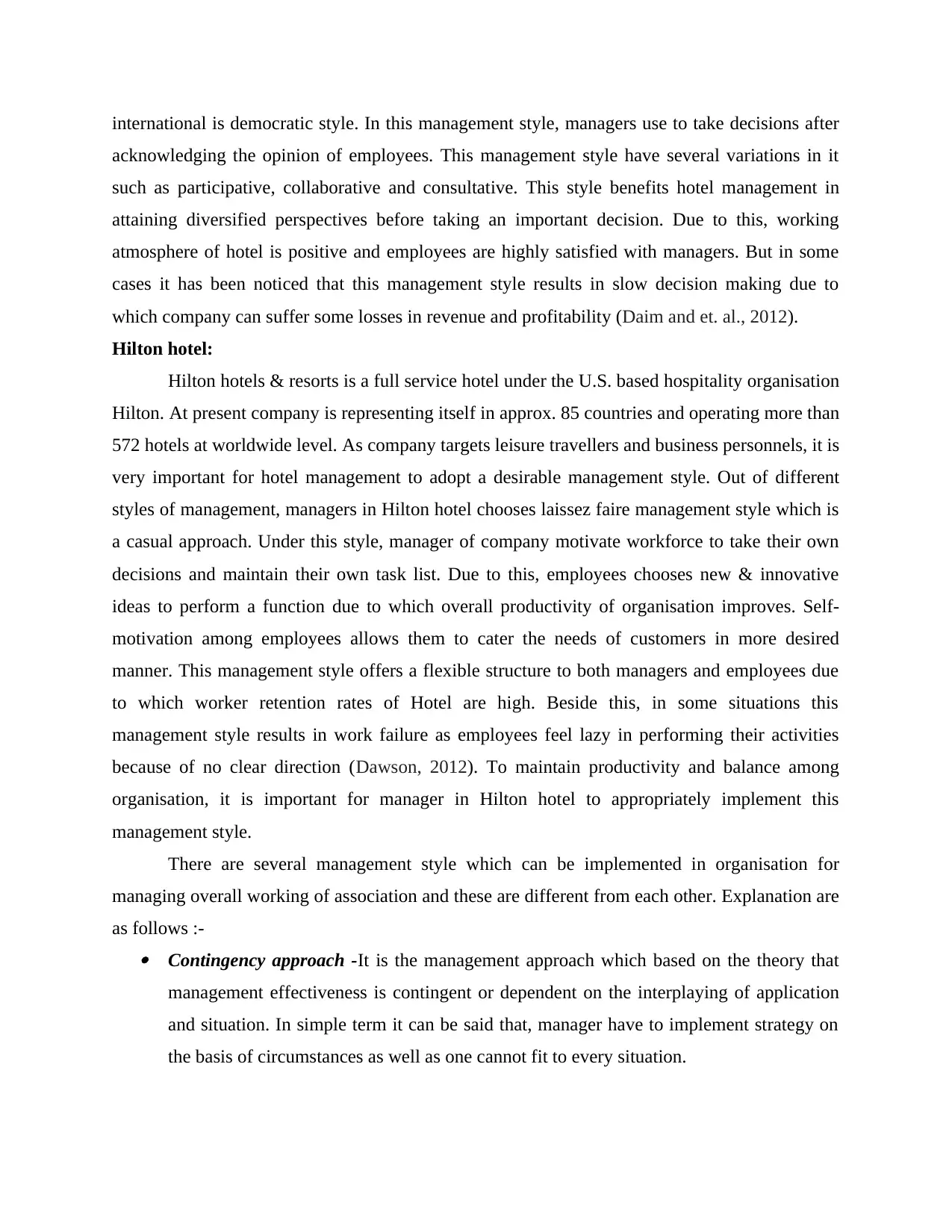
international is democratic style. In this management style, managers use to take decisions after
acknowledging the opinion of employees. This management style have several variations in it
such as participative, collaborative and consultative. This style benefits hotel management in
attaining diversified perspectives before taking an important decision. Due to this, working
atmosphere of hotel is positive and employees are highly satisfied with managers. But in some
cases it has been noticed that this management style results in slow decision making due to
which company can suffer some losses in revenue and profitability (Daim and et. al., 2012).
Hilton hotel:
Hilton hotels & resorts is a full service hotel under the U.S. based hospitality organisation
Hilton. At present company is representing itself in approx. 85 countries and operating more than
572 hotels at worldwide level. As company targets leisure travellers and business personnels, it is
very important for hotel management to adopt a desirable management style. Out of different
styles of management, managers in Hilton hotel chooses laissez faire management style which is
a casual approach. Under this style, manager of company motivate workforce to take their own
decisions and maintain their own task list. Due to this, employees chooses new & innovative
ideas to perform a function due to which overall productivity of organisation improves. Self-
motivation among employees allows them to cater the needs of customers in more desired
manner. This management style offers a flexible structure to both managers and employees due
to which worker retention rates of Hotel are high. Beside this, in some situations this
management style results in work failure as employees feel lazy in performing their activities
because of no clear direction (Dawson, 2012). To maintain productivity and balance among
organisation, it is important for manager in Hilton hotel to appropriately implement this
management style.
There are several management style which can be implemented in organisation for
managing overall working of association and these are different from each other. Explanation are
as follows :- Contingency approach -It is the management approach which based on the theory that
management effectiveness is contingent or dependent on the interplaying of application
and situation. In simple term it can be said that, manager have to implement strategy on
the basis of circumstances as well as one cannot fit to every situation.
acknowledging the opinion of employees. This management style have several variations in it
such as participative, collaborative and consultative. This style benefits hotel management in
attaining diversified perspectives before taking an important decision. Due to this, working
atmosphere of hotel is positive and employees are highly satisfied with managers. But in some
cases it has been noticed that this management style results in slow decision making due to
which company can suffer some losses in revenue and profitability (Daim and et. al., 2012).
Hilton hotel:
Hilton hotels & resorts is a full service hotel under the U.S. based hospitality organisation
Hilton. At present company is representing itself in approx. 85 countries and operating more than
572 hotels at worldwide level. As company targets leisure travellers and business personnels, it is
very important for hotel management to adopt a desirable management style. Out of different
styles of management, managers in Hilton hotel chooses laissez faire management style which is
a casual approach. Under this style, manager of company motivate workforce to take their own
decisions and maintain their own task list. Due to this, employees chooses new & innovative
ideas to perform a function due to which overall productivity of organisation improves. Self-
motivation among employees allows them to cater the needs of customers in more desired
manner. This management style offers a flexible structure to both managers and employees due
to which worker retention rates of Hotel are high. Beside this, in some situations this
management style results in work failure as employees feel lazy in performing their activities
because of no clear direction (Dawson, 2012). To maintain productivity and balance among
organisation, it is important for manager in Hilton hotel to appropriately implement this
management style.
There are several management style which can be implemented in organisation for
managing overall working of association and these are different from each other. Explanation are
as follows :- Contingency approach -It is the management approach which based on the theory that
management effectiveness is contingent or dependent on the interplaying of application
and situation. In simple term it can be said that, manager have to implement strategy on
the basis of circumstances as well as one cannot fit to every situation.
Paraphrase This Document
Need a fresh take? Get an instant paraphrase of this document with our AI Paraphraser
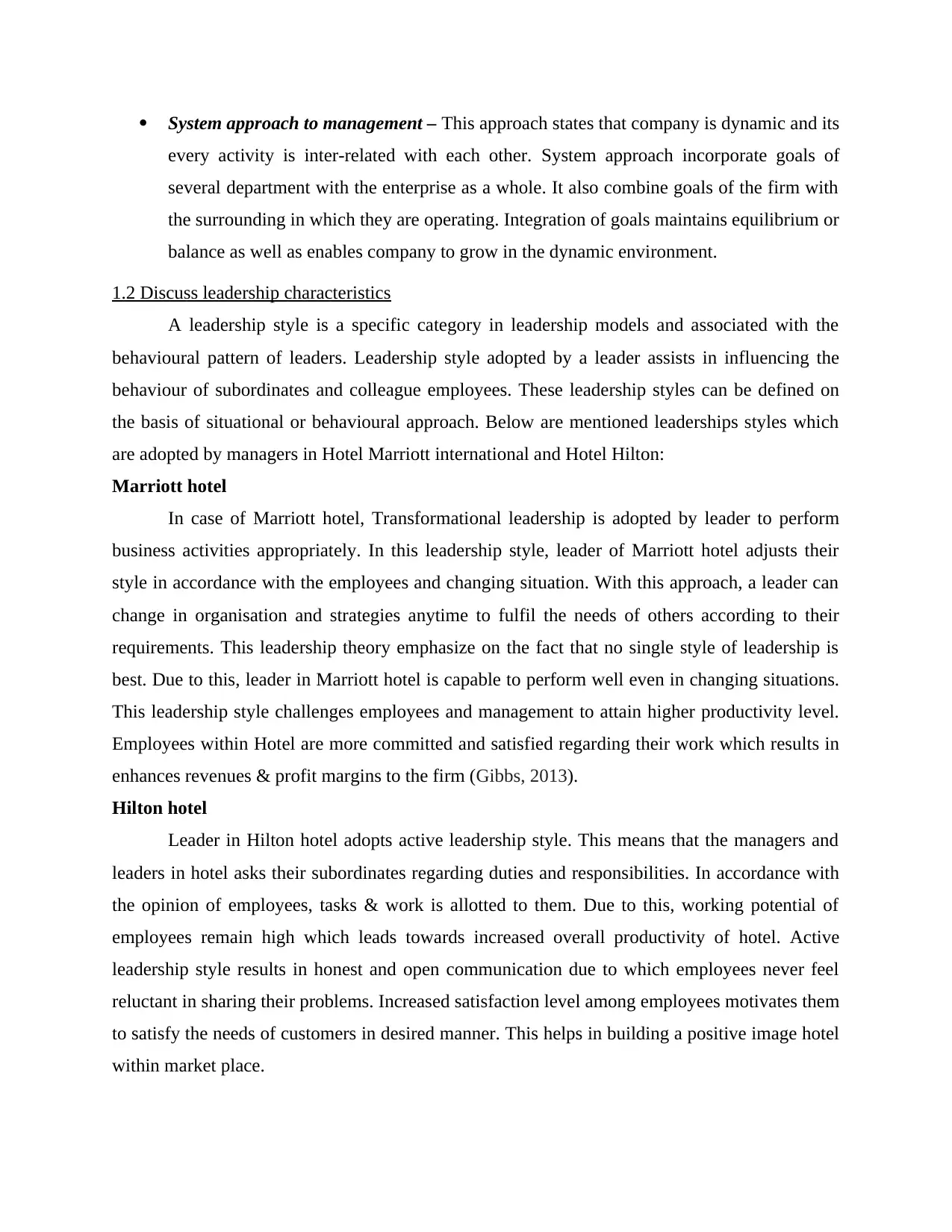
System approach to management – This approach states that company is dynamic and its
every activity is inter-related with each other. System approach incorporate goals of
several department with the enterprise as a whole. It also combine goals of the firm with
the surrounding in which they are operating. Integration of goals maintains equilibrium or
balance as well as enables company to grow in the dynamic environment.
1.2 Discuss leadership characteristics
A leadership style is a specific category in leadership models and associated with the
behavioural pattern of leaders. Leadership style adopted by a leader assists in influencing the
behaviour of subordinates and colleague employees. These leadership styles can be defined on
the basis of situational or behavioural approach. Below are mentioned leaderships styles which
are adopted by managers in Hotel Marriott international and Hotel Hilton:
Marriott hotel
In case of Marriott hotel, Transformational leadership is adopted by leader to perform
business activities appropriately. In this leadership style, leader of Marriott hotel adjusts their
style in accordance with the employees and changing situation. With this approach, a leader can
change in organisation and strategies anytime to fulfil the needs of others according to their
requirements. This leadership theory emphasize on the fact that no single style of leadership is
best. Due to this, leader in Marriott hotel is capable to perform well even in changing situations.
This leadership style challenges employees and management to attain higher productivity level.
Employees within Hotel are more committed and satisfied regarding their work which results in
enhances revenues & profit margins to the firm (Gibbs, 2013).
Hilton hotel
Leader in Hilton hotel adopts active leadership style. This means that the managers and
leaders in hotel asks their subordinates regarding duties and responsibilities. In accordance with
the opinion of employees, tasks & work is allotted to them. Due to this, working potential of
employees remain high which leads towards increased overall productivity of hotel. Active
leadership style results in honest and open communication due to which employees never feel
reluctant in sharing their problems. Increased satisfaction level among employees motivates them
to satisfy the needs of customers in desired manner. This helps in building a positive image hotel
within market place.
every activity is inter-related with each other. System approach incorporate goals of
several department with the enterprise as a whole. It also combine goals of the firm with
the surrounding in which they are operating. Integration of goals maintains equilibrium or
balance as well as enables company to grow in the dynamic environment.
1.2 Discuss leadership characteristics
A leadership style is a specific category in leadership models and associated with the
behavioural pattern of leaders. Leadership style adopted by a leader assists in influencing the
behaviour of subordinates and colleague employees. These leadership styles can be defined on
the basis of situational or behavioural approach. Below are mentioned leaderships styles which
are adopted by managers in Hotel Marriott international and Hotel Hilton:
Marriott hotel
In case of Marriott hotel, Transformational leadership is adopted by leader to perform
business activities appropriately. In this leadership style, leader of Marriott hotel adjusts their
style in accordance with the employees and changing situation. With this approach, a leader can
change in organisation and strategies anytime to fulfil the needs of others according to their
requirements. This leadership theory emphasize on the fact that no single style of leadership is
best. Due to this, leader in Marriott hotel is capable to perform well even in changing situations.
This leadership style challenges employees and management to attain higher productivity level.
Employees within Hotel are more committed and satisfied regarding their work which results in
enhances revenues & profit margins to the firm (Gibbs, 2013).
Hilton hotel
Leader in Hilton hotel adopts active leadership style. This means that the managers and
leaders in hotel asks their subordinates regarding duties and responsibilities. In accordance with
the opinion of employees, tasks & work is allotted to them. Due to this, working potential of
employees remain high which leads towards increased overall productivity of hotel. Active
leadership style results in honest and open communication due to which employees never feel
reluctant in sharing their problems. Increased satisfaction level among employees motivates them
to satisfy the needs of customers in desired manner. This helps in building a positive image hotel
within market place.
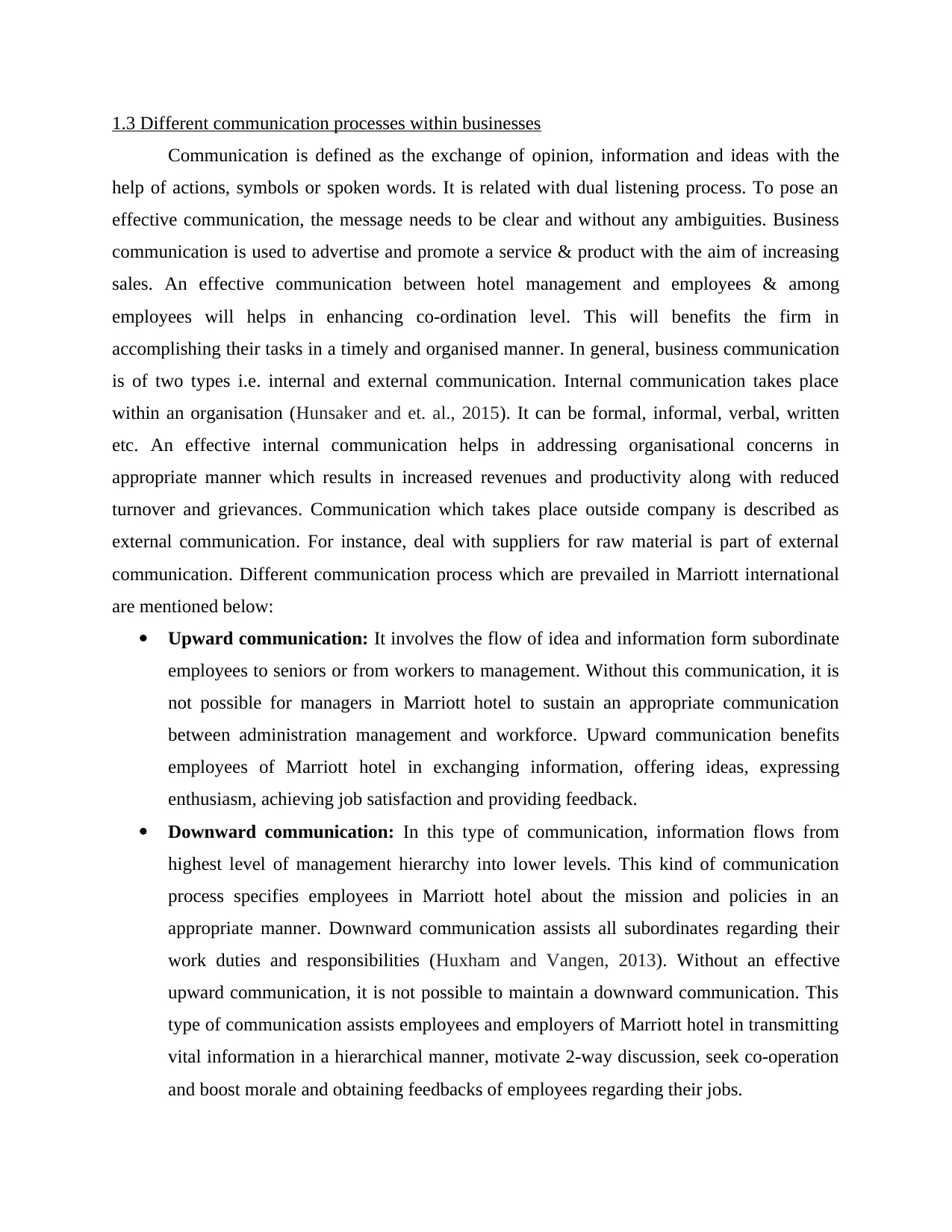
1.3 Different communication processes within businesses
Communication is defined as the exchange of opinion, information and ideas with the
help of actions, symbols or spoken words. It is related with dual listening process. To pose an
effective communication, the message needs to be clear and without any ambiguities. Business
communication is used to advertise and promote a service & product with the aim of increasing
sales. An effective communication between hotel management and employees & among
employees will helps in enhancing co-ordination level. This will benefits the firm in
accomplishing their tasks in a timely and organised manner. In general, business communication
is of two types i.e. internal and external communication. Internal communication takes place
within an organisation (Hunsaker and et. al., 2015). It can be formal, informal, verbal, written
etc. An effective internal communication helps in addressing organisational concerns in
appropriate manner which results in increased revenues and productivity along with reduced
turnover and grievances. Communication which takes place outside company is described as
external communication. For instance, deal with suppliers for raw material is part of external
communication. Different communication process which are prevailed in Marriott international
are mentioned below:
Upward communication: It involves the flow of idea and information form subordinate
employees to seniors or from workers to management. Without this communication, it is
not possible for managers in Marriott hotel to sustain an appropriate communication
between administration management and workforce. Upward communication benefits
employees of Marriott hotel in exchanging information, offering ideas, expressing
enthusiasm, achieving job satisfaction and providing feedback.
Downward communication: In this type of communication, information flows from
highest level of management hierarchy into lower levels. This kind of communication
process specifies employees in Marriott hotel about the mission and policies in an
appropriate manner. Downward communication assists all subordinates regarding their
work duties and responsibilities (Huxham and Vangen, 2013). Without an effective
upward communication, it is not possible to maintain a downward communication. This
type of communication assists employees and employers of Marriott hotel in transmitting
vital information in a hierarchical manner, motivate 2-way discussion, seek co-operation
and boost morale and obtaining feedbacks of employees regarding their jobs.
Communication is defined as the exchange of opinion, information and ideas with the
help of actions, symbols or spoken words. It is related with dual listening process. To pose an
effective communication, the message needs to be clear and without any ambiguities. Business
communication is used to advertise and promote a service & product with the aim of increasing
sales. An effective communication between hotel management and employees & among
employees will helps in enhancing co-ordination level. This will benefits the firm in
accomplishing their tasks in a timely and organised manner. In general, business communication
is of two types i.e. internal and external communication. Internal communication takes place
within an organisation (Hunsaker and et. al., 2015). It can be formal, informal, verbal, written
etc. An effective internal communication helps in addressing organisational concerns in
appropriate manner which results in increased revenues and productivity along with reduced
turnover and grievances. Communication which takes place outside company is described as
external communication. For instance, deal with suppliers for raw material is part of external
communication. Different communication process which are prevailed in Marriott international
are mentioned below:
Upward communication: It involves the flow of idea and information form subordinate
employees to seniors or from workers to management. Without this communication, it is
not possible for managers in Marriott hotel to sustain an appropriate communication
between administration management and workforce. Upward communication benefits
employees of Marriott hotel in exchanging information, offering ideas, expressing
enthusiasm, achieving job satisfaction and providing feedback.
Downward communication: In this type of communication, information flows from
highest level of management hierarchy into lower levels. This kind of communication
process specifies employees in Marriott hotel about the mission and policies in an
appropriate manner. Downward communication assists all subordinates regarding their
work duties and responsibilities (Huxham and Vangen, 2013). Without an effective
upward communication, it is not possible to maintain a downward communication. This
type of communication assists employees and employers of Marriott hotel in transmitting
vital information in a hierarchical manner, motivate 2-way discussion, seek co-operation
and boost morale and obtaining feedbacks of employees regarding their jobs.
⊘ This is a preview!⊘
Do you want full access?
Subscribe today to unlock all pages.

Trusted by 1+ million students worldwide
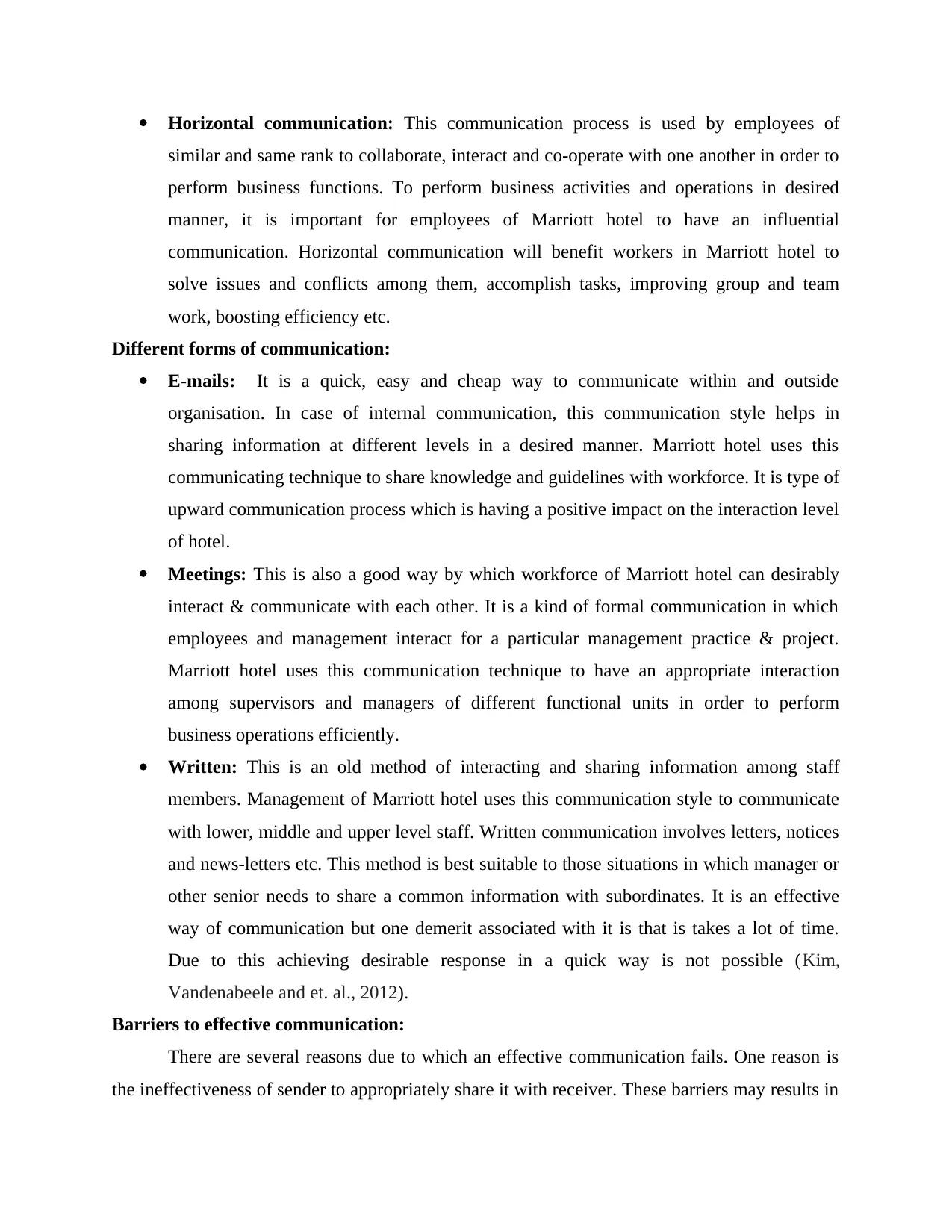
Horizontal communication: This communication process is used by employees of
similar and same rank to collaborate, interact and co-operate with one another in order to
perform business functions. To perform business activities and operations in desired
manner, it is important for employees of Marriott hotel to have an influential
communication. Horizontal communication will benefit workers in Marriott hotel to
solve issues and conflicts among them, accomplish tasks, improving group and team
work, boosting efficiency etc.
Different forms of communication:
E-mails: It is a quick, easy and cheap way to communicate within and outside
organisation. In case of internal communication, this communication style helps in
sharing information at different levels in a desired manner. Marriott hotel uses this
communicating technique to share knowledge and guidelines with workforce. It is type of
upward communication process which is having a positive impact on the interaction level
of hotel.
Meetings: This is also a good way by which workforce of Marriott hotel can desirably
interact & communicate with each other. It is a kind of formal communication in which
employees and management interact for a particular management practice & project.
Marriott hotel uses this communication technique to have an appropriate interaction
among supervisors and managers of different functional units in order to perform
business operations efficiently.
Written: This is an old method of interacting and sharing information among staff
members. Management of Marriott hotel uses this communication style to communicate
with lower, middle and upper level staff. Written communication involves letters, notices
and news-letters etc. This method is best suitable to those situations in which manager or
other senior needs to share a common information with subordinates. It is an effective
way of communication but one demerit associated with it is that is takes a lot of time.
Due to this achieving desirable response in a quick way is not possible (Kim,
Vandenabeele and et. al., 2012).
Barriers to effective communication:
There are several reasons due to which an effective communication fails. One reason is
the ineffectiveness of sender to appropriately share it with receiver. These barriers may results in
similar and same rank to collaborate, interact and co-operate with one another in order to
perform business functions. To perform business activities and operations in desired
manner, it is important for employees of Marriott hotel to have an influential
communication. Horizontal communication will benefit workers in Marriott hotel to
solve issues and conflicts among them, accomplish tasks, improving group and team
work, boosting efficiency etc.
Different forms of communication:
E-mails: It is a quick, easy and cheap way to communicate within and outside
organisation. In case of internal communication, this communication style helps in
sharing information at different levels in a desired manner. Marriott hotel uses this
communicating technique to share knowledge and guidelines with workforce. It is type of
upward communication process which is having a positive impact on the interaction level
of hotel.
Meetings: This is also a good way by which workforce of Marriott hotel can desirably
interact & communicate with each other. It is a kind of formal communication in which
employees and management interact for a particular management practice & project.
Marriott hotel uses this communication technique to have an appropriate interaction
among supervisors and managers of different functional units in order to perform
business operations efficiently.
Written: This is an old method of interacting and sharing information among staff
members. Management of Marriott hotel uses this communication style to communicate
with lower, middle and upper level staff. Written communication involves letters, notices
and news-letters etc. This method is best suitable to those situations in which manager or
other senior needs to share a common information with subordinates. It is an effective
way of communication but one demerit associated with it is that is takes a lot of time.
Due to this achieving desirable response in a quick way is not possible (Kim,
Vandenabeele and et. al., 2012).
Barriers to effective communication:
There are several reasons due to which an effective communication fails. One reason is
the ineffectiveness of sender to appropriately share it with receiver. These barriers may results in
Paraphrase This Document
Need a fresh take? Get an instant paraphrase of this document with our AI Paraphraser
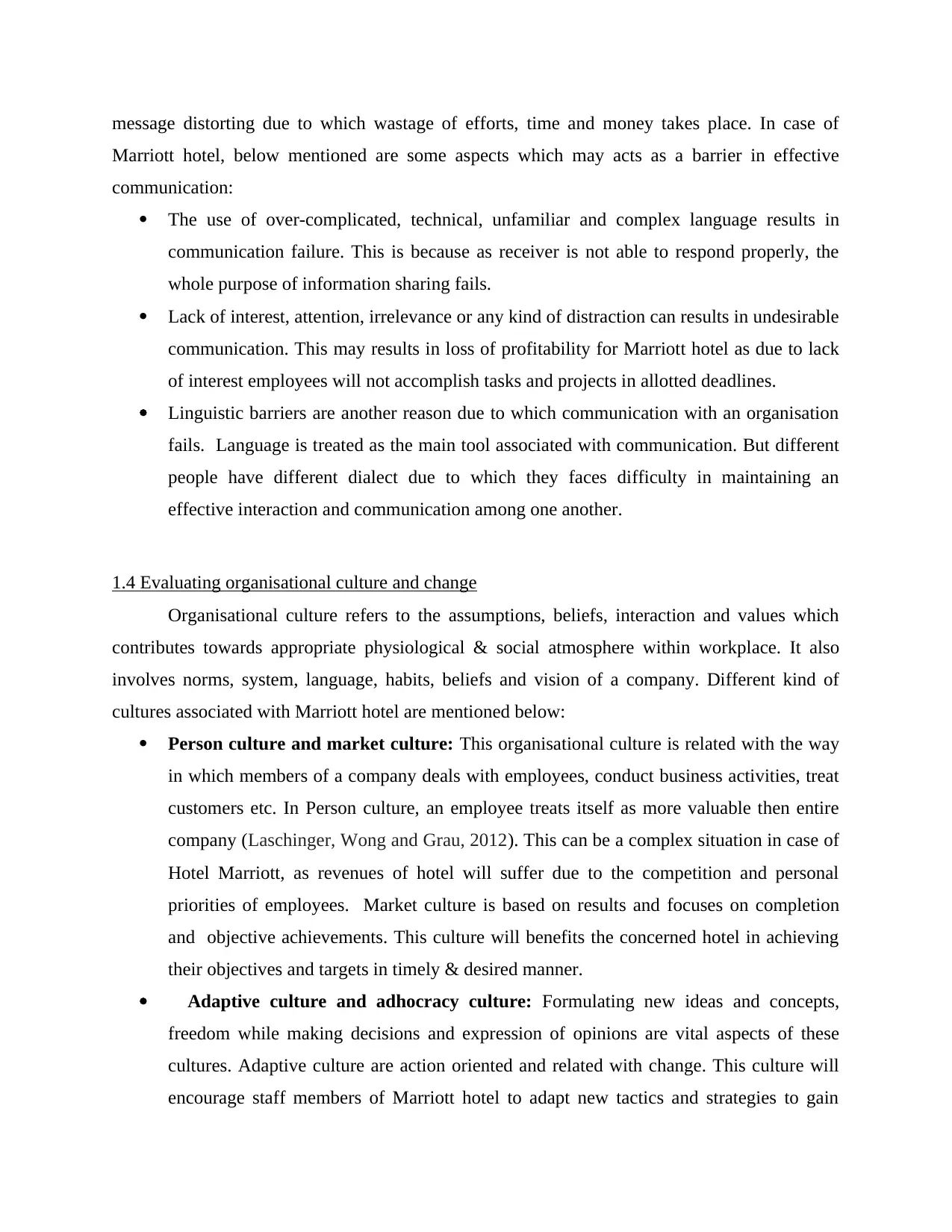
message distorting due to which wastage of efforts, time and money takes place. In case of
Marriott hotel, below mentioned are some aspects which may acts as a barrier in effective
communication:
The use of over-complicated, technical, unfamiliar and complex language results in
communication failure. This is because as receiver is not able to respond properly, the
whole purpose of information sharing fails.
Lack of interest, attention, irrelevance or any kind of distraction can results in undesirable
communication. This may results in loss of profitability for Marriott hotel as due to lack
of interest employees will not accomplish tasks and projects in allotted deadlines.
Linguistic barriers are another reason due to which communication with an organisation
fails. Language is treated as the main tool associated with communication. But different
people have different dialect due to which they faces difficulty in maintaining an
effective interaction and communication among one another.
1.4 Evaluating organisational culture and change
Organisational culture refers to the assumptions, beliefs, interaction and values which
contributes towards appropriate physiological & social atmosphere within workplace. It also
involves norms, system, language, habits, beliefs and vision of a company. Different kind of
cultures associated with Marriott hotel are mentioned below:
Person culture and market culture: This organisational culture is related with the way
in which members of a company deals with employees, conduct business activities, treat
customers etc. In Person culture, an employee treats itself as more valuable then entire
company (Laschinger, Wong and Grau, 2012). This can be a complex situation in case of
Hotel Marriott, as revenues of hotel will suffer due to the competition and personal
priorities of employees. Market culture is based on results and focuses on completion
and objective achievements. This culture will benefits the concerned hotel in achieving
their objectives and targets in timely & desired manner.
Adaptive culture and adhocracy culture: Formulating new ideas and concepts,
freedom while making decisions and expression of opinions are vital aspects of these
cultures. Adaptive culture are action oriented and related with change. This culture will
encourage staff members of Marriott hotel to adapt new tactics and strategies to gain
Marriott hotel, below mentioned are some aspects which may acts as a barrier in effective
communication:
The use of over-complicated, technical, unfamiliar and complex language results in
communication failure. This is because as receiver is not able to respond properly, the
whole purpose of information sharing fails.
Lack of interest, attention, irrelevance or any kind of distraction can results in undesirable
communication. This may results in loss of profitability for Marriott hotel as due to lack
of interest employees will not accomplish tasks and projects in allotted deadlines.
Linguistic barriers are another reason due to which communication with an organisation
fails. Language is treated as the main tool associated with communication. But different
people have different dialect due to which they faces difficulty in maintaining an
effective interaction and communication among one another.
1.4 Evaluating organisational culture and change
Organisational culture refers to the assumptions, beliefs, interaction and values which
contributes towards appropriate physiological & social atmosphere within workplace. It also
involves norms, system, language, habits, beliefs and vision of a company. Different kind of
cultures associated with Marriott hotel are mentioned below:
Person culture and market culture: This organisational culture is related with the way
in which members of a company deals with employees, conduct business activities, treat
customers etc. In Person culture, an employee treats itself as more valuable then entire
company (Laschinger, Wong and Grau, 2012). This can be a complex situation in case of
Hotel Marriott, as revenues of hotel will suffer due to the competition and personal
priorities of employees. Market culture is based on results and focuses on completion
and objective achievements. This culture will benefits the concerned hotel in achieving
their objectives and targets in timely & desired manner.
Adaptive culture and adhocracy culture: Formulating new ideas and concepts,
freedom while making decisions and expression of opinions are vital aspects of these
cultures. Adaptive culture are action oriented and related with change. This culture will
encourage staff members of Marriott hotel to adapt new tactics and strategies to gain
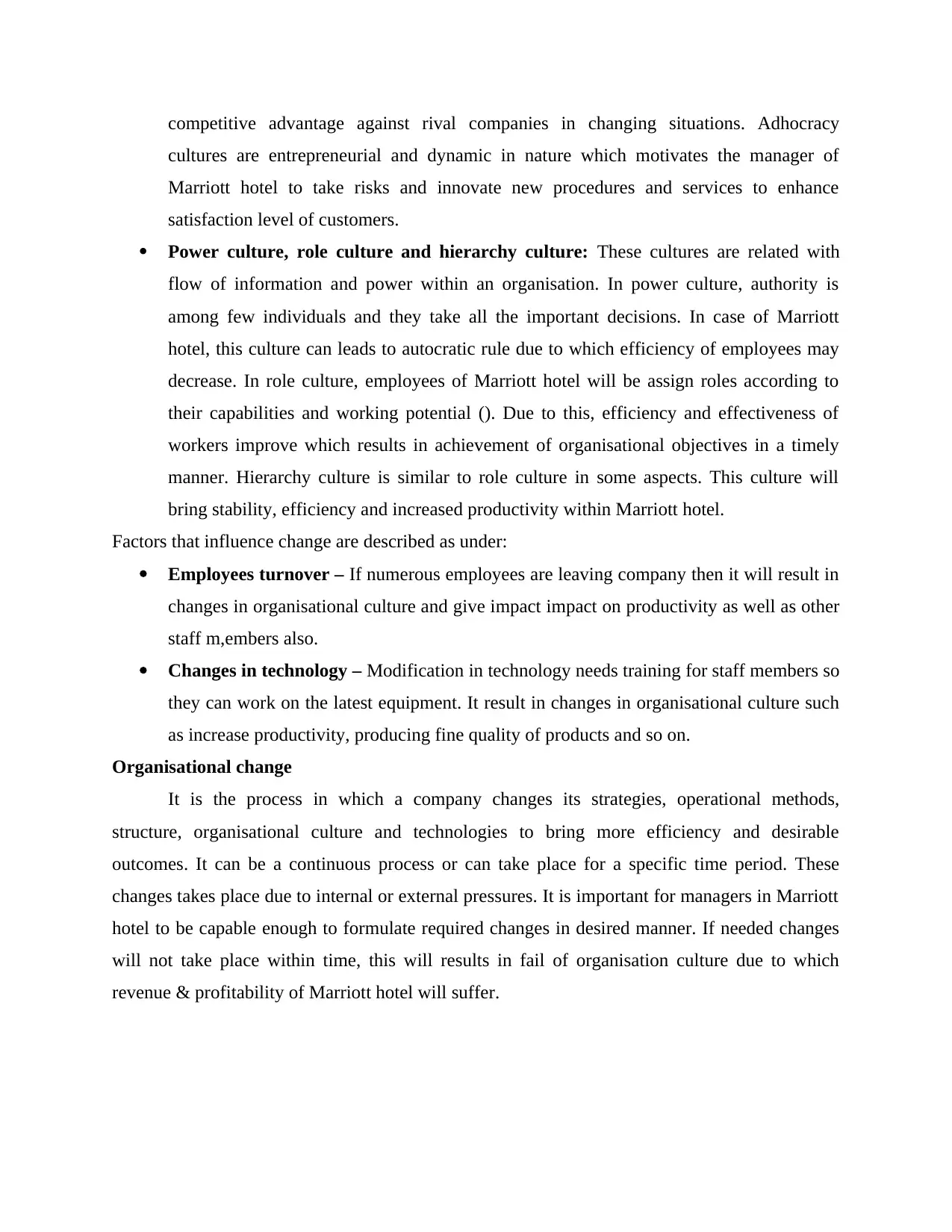
competitive advantage against rival companies in changing situations. Adhocracy
cultures are entrepreneurial and dynamic in nature which motivates the manager of
Marriott hotel to take risks and innovate new procedures and services to enhance
satisfaction level of customers.
Power culture, role culture and hierarchy culture: These cultures are related with
flow of information and power within an organisation. In power culture, authority is
among few individuals and they take all the important decisions. In case of Marriott
hotel, this culture can leads to autocratic rule due to which efficiency of employees may
decrease. In role culture, employees of Marriott hotel will be assign roles according to
their capabilities and working potential (). Due to this, efficiency and effectiveness of
workers improve which results in achievement of organisational objectives in a timely
manner. Hierarchy culture is similar to role culture in some aspects. This culture will
bring stability, efficiency and increased productivity within Marriott hotel.
Factors that influence change are described as under:
Employees turnover – If numerous employees are leaving company then it will result in
changes in organisational culture and give impact impact on productivity as well as other
staff m,embers also.
Changes in technology – Modification in technology needs training for staff members so
they can work on the latest equipment. It result in changes in organisational culture such
as increase productivity, producing fine quality of products and so on.
Organisational change
It is the process in which a company changes its strategies, operational methods,
structure, organisational culture and technologies to bring more efficiency and desirable
outcomes. It can be a continuous process or can take place for a specific time period. These
changes takes place due to internal or external pressures. It is important for managers in Marriott
hotel to be capable enough to formulate required changes in desired manner. If needed changes
will not take place within time, this will results in fail of organisation culture due to which
revenue & profitability of Marriott hotel will suffer.
cultures are entrepreneurial and dynamic in nature which motivates the manager of
Marriott hotel to take risks and innovate new procedures and services to enhance
satisfaction level of customers.
Power culture, role culture and hierarchy culture: These cultures are related with
flow of information and power within an organisation. In power culture, authority is
among few individuals and they take all the important decisions. In case of Marriott
hotel, this culture can leads to autocratic rule due to which efficiency of employees may
decrease. In role culture, employees of Marriott hotel will be assign roles according to
their capabilities and working potential (). Due to this, efficiency and effectiveness of
workers improve which results in achievement of organisational objectives in a timely
manner. Hierarchy culture is similar to role culture in some aspects. This culture will
bring stability, efficiency and increased productivity within Marriott hotel.
Factors that influence change are described as under:
Employees turnover – If numerous employees are leaving company then it will result in
changes in organisational culture and give impact impact on productivity as well as other
staff m,embers also.
Changes in technology – Modification in technology needs training for staff members so
they can work on the latest equipment. It result in changes in organisational culture such
as increase productivity, producing fine quality of products and so on.
Organisational change
It is the process in which a company changes its strategies, operational methods,
structure, organisational culture and technologies to bring more efficiency and desirable
outcomes. It can be a continuous process or can take place for a specific time period. These
changes takes place due to internal or external pressures. It is important for managers in Marriott
hotel to be capable enough to formulate required changes in desired manner. If needed changes
will not take place within time, this will results in fail of organisation culture due to which
revenue & profitability of Marriott hotel will suffer.
⊘ This is a preview!⊘
Do you want full access?
Subscribe today to unlock all pages.

Trusted by 1+ million students worldwide
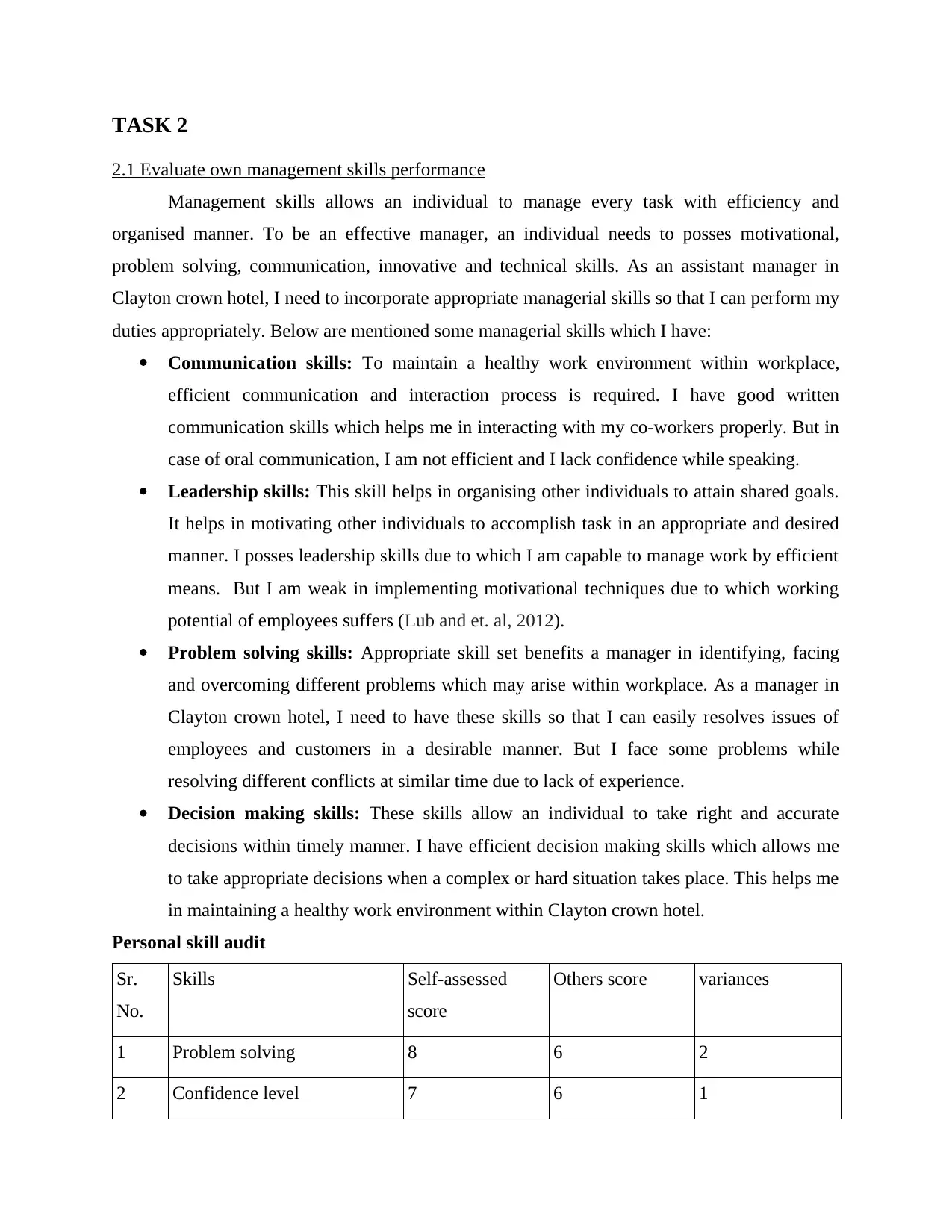
TASK 2
2.1 Evaluate own management skills performance
Management skills allows an individual to manage every task with efficiency and
organised manner. To be an effective manager, an individual needs to posses motivational,
problem solving, communication, innovative and technical skills. As an assistant manager in
Clayton crown hotel, I need to incorporate appropriate managerial skills so that I can perform my
duties appropriately. Below are mentioned some managerial skills which I have:
Communication skills: To maintain a healthy work environment within workplace,
efficient communication and interaction process is required. I have good written
communication skills which helps me in interacting with my co-workers properly. But in
case of oral communication, I am not efficient and I lack confidence while speaking.
Leadership skills: This skill helps in organising other individuals to attain shared goals.
It helps in motivating other individuals to accomplish task in an appropriate and desired
manner. I posses leadership skills due to which I am capable to manage work by efficient
means. But I am weak in implementing motivational techniques due to which working
potential of employees suffers (Lub and et. al, 2012).
Problem solving skills: Appropriate skill set benefits a manager in identifying, facing
and overcoming different problems which may arise within workplace. As a manager in
Clayton crown hotel, I need to have these skills so that I can easily resolves issues of
employees and customers in a desirable manner. But I face some problems while
resolving different conflicts at similar time due to lack of experience.
Decision making skills: These skills allow an individual to take right and accurate
decisions within timely manner. I have efficient decision making skills which allows me
to take appropriate decisions when a complex or hard situation takes place. This helps me
in maintaining a healthy work environment within Clayton crown hotel.
Personal skill audit
Sr.
No.
Skills Self-assessed
score
Others score variances
1 Problem solving 8 6 2
2 Confidence level 7 6 1
2.1 Evaluate own management skills performance
Management skills allows an individual to manage every task with efficiency and
organised manner. To be an effective manager, an individual needs to posses motivational,
problem solving, communication, innovative and technical skills. As an assistant manager in
Clayton crown hotel, I need to incorporate appropriate managerial skills so that I can perform my
duties appropriately. Below are mentioned some managerial skills which I have:
Communication skills: To maintain a healthy work environment within workplace,
efficient communication and interaction process is required. I have good written
communication skills which helps me in interacting with my co-workers properly. But in
case of oral communication, I am not efficient and I lack confidence while speaking.
Leadership skills: This skill helps in organising other individuals to attain shared goals.
It helps in motivating other individuals to accomplish task in an appropriate and desired
manner. I posses leadership skills due to which I am capable to manage work by efficient
means. But I am weak in implementing motivational techniques due to which working
potential of employees suffers (Lub and et. al, 2012).
Problem solving skills: Appropriate skill set benefits a manager in identifying, facing
and overcoming different problems which may arise within workplace. As a manager in
Clayton crown hotel, I need to have these skills so that I can easily resolves issues of
employees and customers in a desirable manner. But I face some problems while
resolving different conflicts at similar time due to lack of experience.
Decision making skills: These skills allow an individual to take right and accurate
decisions within timely manner. I have efficient decision making skills which allows me
to take appropriate decisions when a complex or hard situation takes place. This helps me
in maintaining a healthy work environment within Clayton crown hotel.
Personal skill audit
Sr.
No.
Skills Self-assessed
score
Others score variances
1 Problem solving 8 6 2
2 Confidence level 7 6 1
Paraphrase This Document
Need a fresh take? Get an instant paraphrase of this document with our AI Paraphraser
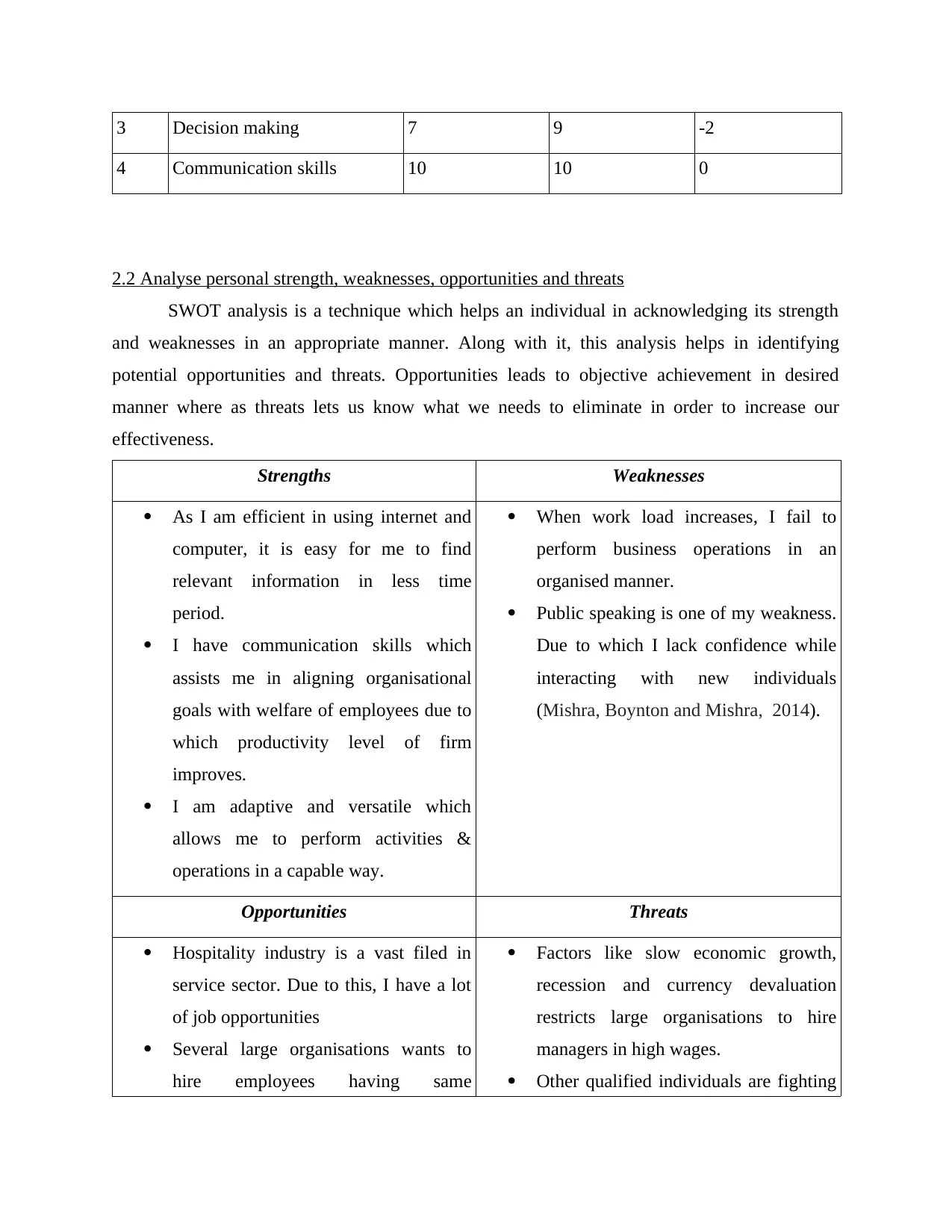
3 Decision making 7 9 -2
4 Communication skills 10 10 0
2.2 Analyse personal strength, weaknesses, opportunities and threats
SWOT analysis is a technique which helps an individual in acknowledging its strength
and weaknesses in an appropriate manner. Along with it, this analysis helps in identifying
potential opportunities and threats. Opportunities leads to objective achievement in desired
manner where as threats lets us know what we needs to eliminate in order to increase our
effectiveness.
Strengths Weaknesses
As I am efficient in using internet and
computer, it is easy for me to find
relevant information in less time
period.
I have communication skills which
assists me in aligning organisational
goals with welfare of employees due to
which productivity level of firm
improves.
I am adaptive and versatile which
allows me to perform activities &
operations in a capable way.
When work load increases, I fail to
perform business operations in an
organised manner.
Public speaking is one of my weakness.
Due to which I lack confidence while
interacting with new individuals
(Mishra, Boynton and Mishra, 2014).
Opportunities Threats
Hospitality industry is a vast filed in
service sector. Due to this, I have a lot
of job opportunities
Several large organisations wants to
hire employees having same
Factors like slow economic growth,
recession and currency devaluation
restricts large organisations to hire
managers in high wages.
Other qualified individuals are fighting
4 Communication skills 10 10 0
2.2 Analyse personal strength, weaknesses, opportunities and threats
SWOT analysis is a technique which helps an individual in acknowledging its strength
and weaknesses in an appropriate manner. Along with it, this analysis helps in identifying
potential opportunities and threats. Opportunities leads to objective achievement in desired
manner where as threats lets us know what we needs to eliminate in order to increase our
effectiveness.
Strengths Weaknesses
As I am efficient in using internet and
computer, it is easy for me to find
relevant information in less time
period.
I have communication skills which
assists me in aligning organisational
goals with welfare of employees due to
which productivity level of firm
improves.
I am adaptive and versatile which
allows me to perform activities &
operations in a capable way.
When work load increases, I fail to
perform business operations in an
organised manner.
Public speaking is one of my weakness.
Due to which I lack confidence while
interacting with new individuals
(Mishra, Boynton and Mishra, 2014).
Opportunities Threats
Hospitality industry is a vast filed in
service sector. Due to this, I have a lot
of job opportunities
Several large organisations wants to
hire employees having same
Factors like slow economic growth,
recession and currency devaluation
restricts large organisations to hire
managers in high wages.
Other qualified individuals are fighting
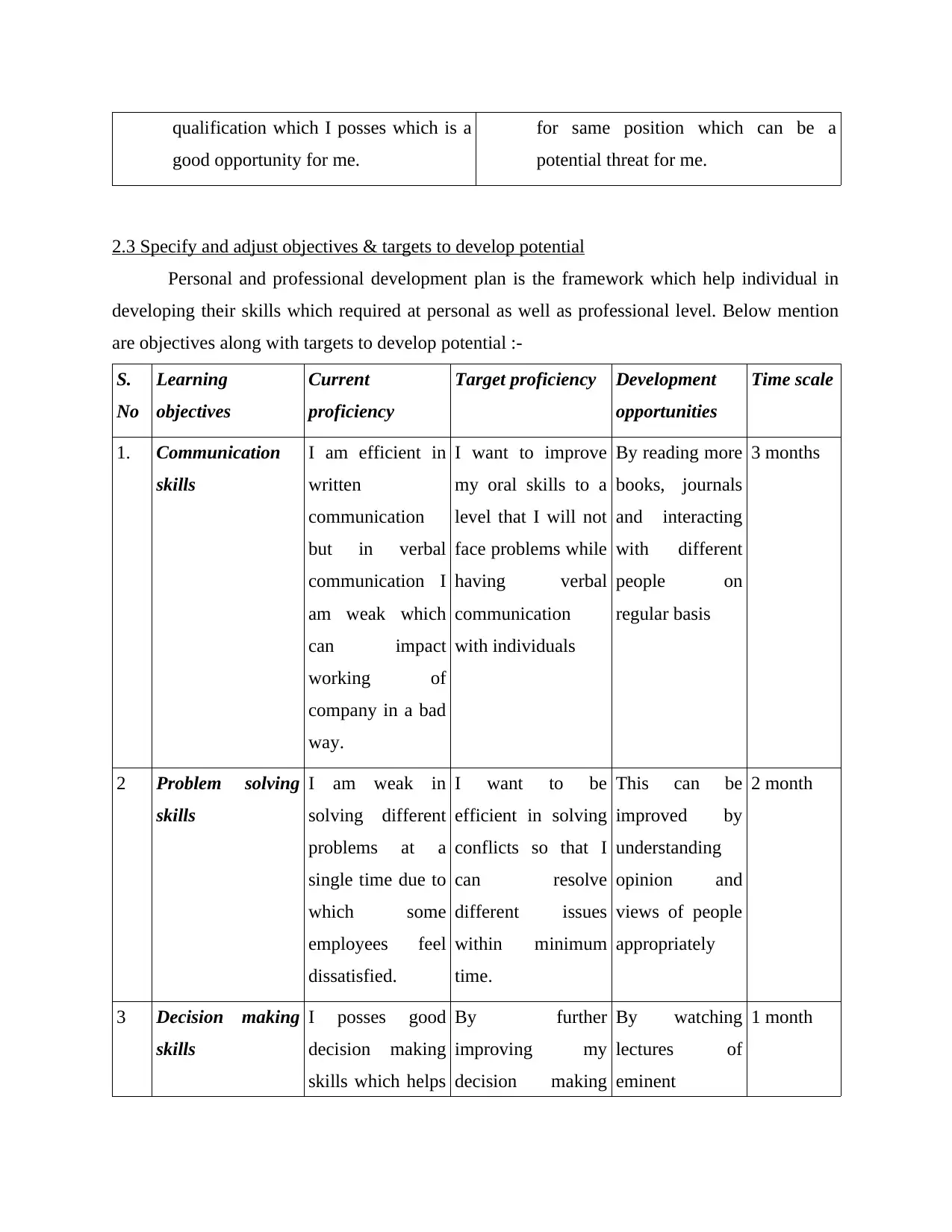
qualification which I posses which is a
good opportunity for me.
for same position which can be a
potential threat for me.
2.3 Specify and adjust objectives & targets to develop potential
Personal and professional development plan is the framework which help individual in
developing their skills which required at personal as well as professional level. Below mention
are objectives along with targets to develop potential :-
S.
No
Learning
objectives
Current
proficiency
Target proficiency Development
opportunities
Time scale
1. Communication
skills
I am efficient in
written
communication
but in verbal
communication I
am weak which
can impact
working of
company in a bad
way.
I want to improve
my oral skills to a
level that I will not
face problems while
having verbal
communication
with individuals
By reading more
books, journals
and interacting
with different
people on
regular basis
3 months
2 Problem solving
skills
I am weak in
solving different
problems at a
single time due to
which some
employees feel
dissatisfied.
I want to be
efficient in solving
conflicts so that I
can resolve
different issues
within minimum
time.
This can be
improved by
understanding
opinion and
views of people
appropriately
2 month
3 Decision making
skills
I posses good
decision making
skills which helps
By further
improving my
decision making
By watching
lectures of
eminent
1 month
good opportunity for me.
for same position which can be a
potential threat for me.
2.3 Specify and adjust objectives & targets to develop potential
Personal and professional development plan is the framework which help individual in
developing their skills which required at personal as well as professional level. Below mention
are objectives along with targets to develop potential :-
S.
No
Learning
objectives
Current
proficiency
Target proficiency Development
opportunities
Time scale
1. Communication
skills
I am efficient in
written
communication
but in verbal
communication I
am weak which
can impact
working of
company in a bad
way.
I want to improve
my oral skills to a
level that I will not
face problems while
having verbal
communication
with individuals
By reading more
books, journals
and interacting
with different
people on
regular basis
3 months
2 Problem solving
skills
I am weak in
solving different
problems at a
single time due to
which some
employees feel
dissatisfied.
I want to be
efficient in solving
conflicts so that I
can resolve
different issues
within minimum
time.
This can be
improved by
understanding
opinion and
views of people
appropriately
2 month
3 Decision making
skills
I posses good
decision making
skills which helps
By further
improving my
decision making
By watching
lectures of
eminent
1 month
⊘ This is a preview!⊘
Do you want full access?
Subscribe today to unlock all pages.

Trusted by 1+ million students worldwide
1 out of 19
Related Documents
Your All-in-One AI-Powered Toolkit for Academic Success.
+13062052269
info@desklib.com
Available 24*7 on WhatsApp / Email
![[object Object]](/_next/static/media/star-bottom.7253800d.svg)
Unlock your academic potential
Copyright © 2020–2026 A2Z Services. All Rights Reserved. Developed and managed by ZUCOL.




